-
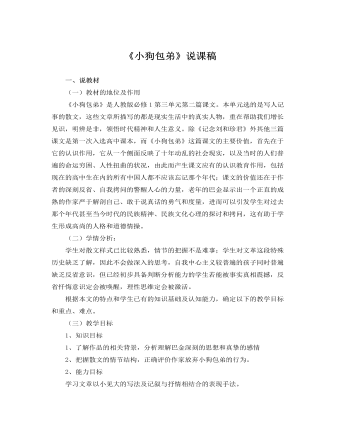
人教版高中语文必修1《小狗包弟》说课稿
探究、讨论、交流:1、包弟讨人喜欢,作者却不得不将它送走,为什么?2、送走包弟后,作者为什么先是感觉轻松,随后觉得沉重?3、“您的小狗怎样?”这句话反复出现,有什么用意?4、“整整十三年零五个月过去了”“整整”一词有什么作用?5、“满园的创伤使我的心仿佛又给放在油锅里熬煎”这句话如何理解?6、“我怀念包弟,我想向它表示歉意。”如何理解?学生各抒己见后教师结合材料发表看法明确总结特别是最后一个问题得出作者这发之心底的语言,不仅仅是歉意,更是发自灵魂深处的忏悔!是对生命的尊重,是一个有良知的作家对反省历史的呼号。第三环节“认识你自己”——忏悔意识与我引导学生正视和反省成长过程中曾犯下过错。并布置课后作业:要求学生课后在本周随笔中谈反省忏悔后的感受。
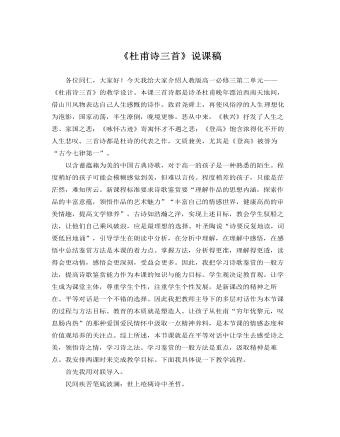
人教版高中语文必修3《杜甫诗三首》说课稿
我以以《登高》为例,引导学生进行意象分析,感悟意境美。古人云“立象以尽意”“古诗之妙,专求意象”意象是诗人情感的载体,是诗歌的灵魂。引导学生张开联想和想象的翅膀去感受,去体验是意象,诗歌鉴赏的关键。科林伍德说“真正艺术的作品,不是看见的,也不是听到的,而是想象中的某种东西。”诗人通过想象创造出诗的形象,我们读者通过想象丰富地再现诗人创造的形象。而感受体验则是以全部身心投入作品,心灵与心灵相沟通,感情与感情相交流,对诗人的想象活动进行再经历和再体验。因此,在引导意象解读中,我先让学生点击这一个,就是通过抓修饰词、依据感情基调、展开想象具体分析本诗中每个意象的情感意蕴和审美意蕴,使学生明白意象在每首诗中的独特性。
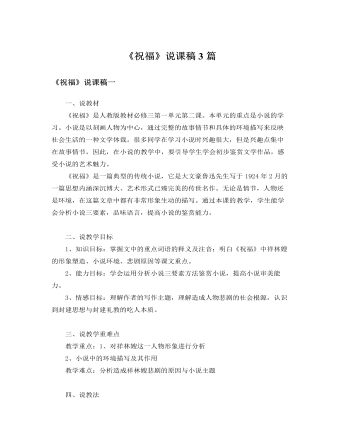
人教版高中语文必修3《祝福》说课稿3篇
各位评委老师,大家好。我说课的题目是《祝福》。一、说教材(一)教材所处的位置和地位高中语文新课程教材必修五本书,共有2个单元中外小说单元。一个必修3的第一单元,一个是必修5的第一单元,共六篇文章。(《林黛玉进贾府》《祝福》《老人与海》《林教头风雪山神庙》《装在套子里的人》《边城》)《祝福》是属于前者。小说是拥有众多读者的一种文体,它可以多方面刻画人物性格,描摹人物心理,完整地表现人物之间的冲突,还可以具体生动地再现人物生活的环境,因此在反映复杂的社会生活方面具有独特优势。所以学习小说这种文学样式,也是有助于学生学会鉴赏小说的基本方法,为将来的小说阅读打下基础。鲁迅的《祝福》是中国现代小说的精品,当中的人物祥林嫂也是鲁迅小说中与阿Q、孔乙己三个最为出名的人物之一。研读好这篇文章,对将来小说的阅读,小说中人物的理解,甚至小说的写作都有深广意义。
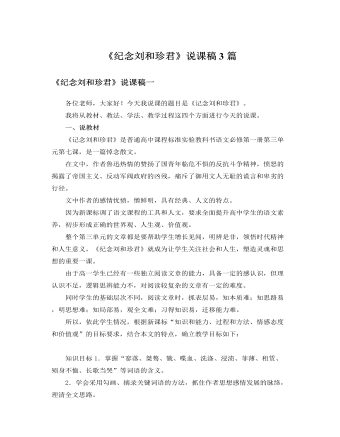
人教版高中语文必修1《纪念刘和珍君》说课稿3篇
1.说教材《记念刘和珍君》是鲁迅先生用饱醮着热泪,用悲愤的笔调写下的一篇感人至深的散文,既有对爱国青年沉痛的悼念,又有对反动派愤怒的控诉,也有对觉醒的国民的呐喊。《记念刘和珍君》是高中语文必修1第三单元第一课的讲读课文。文中描摹人物的音容笑貌,叙述人物的行为事迹,都融入了作者真挚的情感和深刻的感悟。对学生明辨是非,领悟时代精神和人生意义,有着重要的作用。新课标强调了要全面提升高中学生的语文素养,初步形成正确的世界观、人生观、价值观,并学会收集、判断、处理信息,具有人文素养、创新精神与实践能力。同时,《记念刘和珍君》感情真挚,感悟深刻,具有典型人文性。结合本单元教学目标,确立教学目标如下。
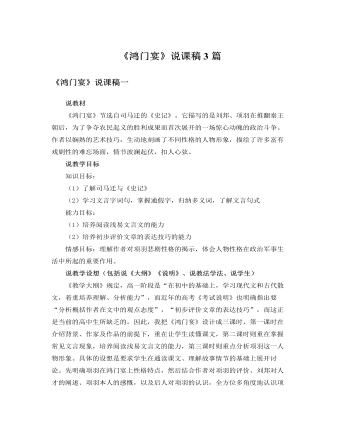
人教版高中语文必修1《鸿门宴》说课稿3篇
3、拓展延伸,启迪心智,创设课堂训练营。三、说学法1、纸上得来终觉浅,圈点、勾画、批注法,学好文言基本功。2、自主合作加探究,眼耳口脑手并用,破疑解难在其中。四、说课时安排《鸿门宴》篇幅较长,文言知识较丰富,文章内涵丰厚,因此我设计用五课时教学本文。第一课时:了解作家作品,积累文言知识,感受作者隐忍发愤的著书精神(初读)第二课时:理清故事情节,概括人物形象,学习客观地评论历史人物,(熟读)第三课时:进一步梳理文言知识,精读课文,要求读透。(精读)第四课时:通过对人物、事件的赏析,加深学生对人物的理解,锻炼学生的开放性思维,由学生自主认识到人物的性格,悲剧的原因等问题。(赏读)第五课时:补充课本教学内容:同学生一起阅读古今关于刘邦项羽的一些篇章:让学生投入进来,把握自己眼中的项羽。(展读)在文言文学习的过程中,采取五步学习法:初读-熟读-精读-赏读-展读(板书)
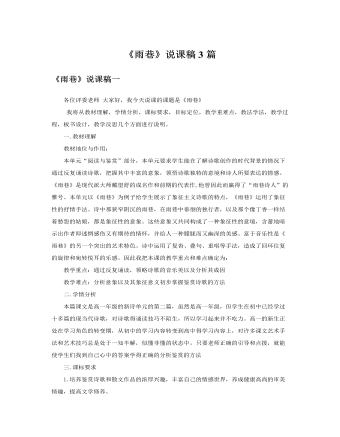
人教版高中语文必修1《雨巷》说课稿3篇
一.教材理解教材地位与作用:本单元“阅读与鉴赏”部分,本单元要求学生能在了解诗歌创作的时代背景的情况下通过反复诵读诗歌,把握其中丰富的意象,领悟诗歌独特的意境和诗人所要表达的情感。《雨巷》是现代派大师戴望舒的成名作和前期的代表作,他曾因此而赢得了“雨巷诗人”的雅号。本单元以《雨巷》为例子给学生展示了象征主义诗歌的特点,《雨巷》运用了象征性的抒情手法。诗中那狭窄阴沉的雨巷,在雨巷中徘徊的独行者,以及那个像丁香一样结着愁怨的姑娘,都是象征性的意象。这些意象又共同构成了一种象征性的意境,含蓄地暗示出作者即迷惘感伤又有期待的情怀,并给人一种朦胧而又幽深的美感。富于音乐性是《雨巷》的另一个突出的艺术特色。诗中运用了复沓、叠句、重唱等手法,造成了回环往复的旋律和宛转悦耳的乐感。因此我把本课的教学重点和难点确定为:教学重点:通过反复诵读,领略诗歌的音乐美以及分析其成因教学难点:分析意象以及其象征意义初步掌握鉴赏诗歌的方法
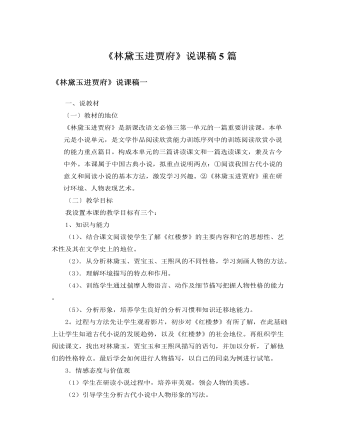
人教版高中语文必修3《林黛玉进贾府》说课稿5篇
【教学目标】我设置的本课的教学目标有三个:1、知识与技能(1)了解曹雪芹及《红楼梦》(2)学习通过一个人物的行踪、所见所闻,介绍典型环境,认识封建贵族阶级豪奢极耻的生活以及森严的等级、礼仪制度(3)分析小说人物出场的描写艺术,培养学生分析小说人物形象的能力。(4)一叶落而知秋”,通过对“林黛玉进贾府”这一故事情节的把握是否能引发对《红楼梦》的认知兴趣,并找到一个突破口,有针对性地进行自主探究,进而进行个性化解读。(5)整体认知小说,认识小说悲剧的必然性和思想价值.2、过程与方法(1)用直观演示和归纳探究法分析文章要点。(2)用讨论探究法体验作者对文中人物的情感态度。3、情感态度价值观(1)正确理解《红楼梦》的思想内涵,培养学生热爱祖国传统文化的思想感情。(2)认识封建大家族的腐朽没落,理解贾宝玉追求个性自由反封建的精神。
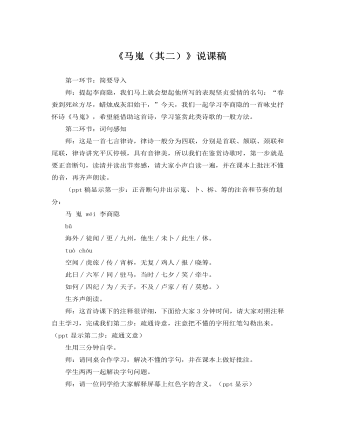
人教版高中语文必修3《马嵬(其二)》说课稿
生2:颔联的意思是只听到禁卫军中传来夜间巡逻的梆子声,不再向宫中那样安逸地听到有鸡人打鸣报时的声音了。生3:颈联的意思是说事变发生那天军队发生哗变停留不前,但当年唐玄宗以为自己可以和贵妃天天在一起,对天上的牵牛和织女一年一度的会见还加以嘲笑呢。生4:尾联的含义是为什么唐玄宗当了四十五年的皇帝,还不如普通百姓夫妻恩爱,长相厮守。师:好的。请大家再齐读一遍诗文,做到人人都能疏通诗的含义。学生再次齐读。第三环节:专项探究师:白居易曾说:“文章合为时而著,歌诗合为事而作。”这首诗就是作者途经马嵬驿,咏马嵬之变这一历史事件而作,所以我们鉴赏的第三步,就是通过标题和诗文,弄清诗中的历史事件。请同学们找出诗中哪些诗句描述了这一事件?
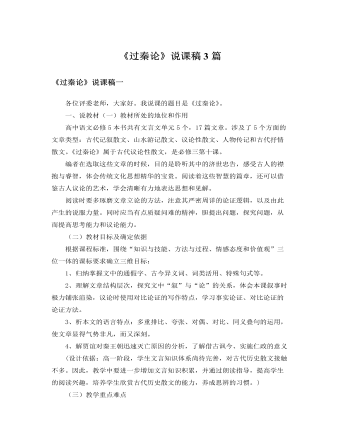
人教版高中语文必修3《过秦论》说课稿3篇
本文篇幅较长,并且有一字句不易理解,因而对高一学生来说完全读懂内容有一些困难。这样的话,老师就要做好引导工作,把一些难点,或是出现词类活用比较多,局势比较特殊的句子,老师可以先给学生画出来,存疑,或是与同学们一起讨论解决。对那些不易懂的字词就引导学生联系上下文提供的语境、前后涉及的情节加以推测、判断,以培养学生依据文脉推断词义的好方法。要求学生点出重点实词、框出通假字,主要是为帮助学生积累和掌握一些文言文中常见的一词多义、异读现象、古今异义和通假现象的词语,并进一步得出规律,指导今后的文言文学习。词类活用和特殊句式在文言文翻译中难度较大,也是本文教学的两大难点。要求学生标出有活用现象的字和划出句式特殊的句子,是基于两点考虑:1、积累一定数量的第一手例句;2、引导学生加以分类,找出每类的相同特征,并抽取出来形成规律性的东西,从而上升到理性认识,使学生能由学会一个到会学多个。翻译过程中注重指导学生养成用符号法表示重点字句的好习惯,如点、框、圈、划线等符号应约定一致,便于突出翻译中的重点、难点及复习。我的提示着重归纳了实词“制”“亡”“遗”“利”等,名词活用、形容词活用、使动用法,被动句、状语后置句。
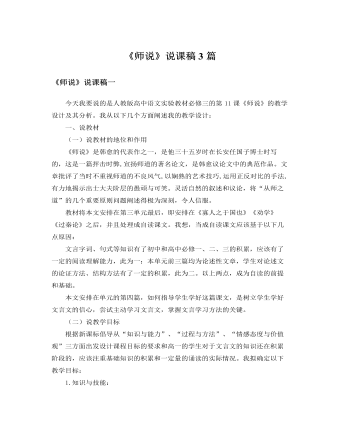
人教版高中语文必修3《师说》说课稿3篇
一、设计理念教学设计坚持少讲多学、以学为主的教学理念,重视学培养生的学习兴趣,要充分调动学生学习的积极性和主动性,充分发挥学生的主体性。教师要以组织者、引导者、合作者的角色参与到教学活动中去。力图通过导学案努力培养学生的自学习惯和自学能力。二、教材分析与处理1、教材的地位与作用:必修三第三单元所选的文言文都是古代的议论性散文。本课是“唐宋八大家”之首、中唐古文运动的倡导者韩愈的力作,是唐宋散文中的名篇,具有很强的代表性。通过这篇自读课的学习,能使学生了解唐宋散文的风貌,更能使学生进一步积累文言文基础知识,提高学生的文言文阅读欣赏能力,从而提升学生的文言文自读能力。2、教学目标:《高中语文课程标准》要求高中学生能阅读浅易文言文,能借助注释和工具书,理解词句含义,读懂文章内容;了解并梳理常见的文言实词、文言虚词、文言句式的意义或用法,注重在阅读实践中举一反三;对文章有一定的分析欣赏能力。高一的学生对于文言文的知识还在积累阶段,应该注重基础知识的积累和一定量的诵读。对此,我将教学目标确定为:
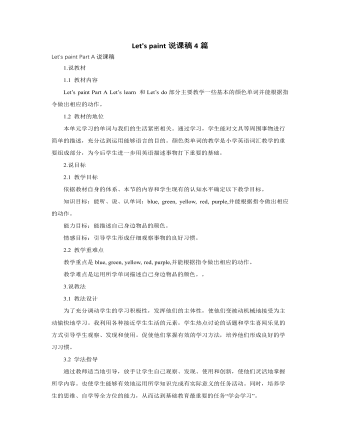
人教版新课标PEP小学英语三年级上册Let's paint说课稿4篇
本课教学从激发学生的兴趣入手,引导学生由词到句,循序渐进地达到学习目标,整个教学体现全员参与,体现合作探究,体现生活实践,在活动中开始,在情景中操练,在运用中创新,充分发挥学生的自主性,创造性。在整堂英语课堂教学中最大限度地激发学生的学习兴趣,使小学生在一节课的时间里始终保持高昂的学习状态。产生事半功倍的效果。 三、说教学手段 小学生的形象思维在其认识过程中占主导地位,三年级学生刚刚接触英语,学习一般靠直觉和体验,不善于把握语言规律,以直观的形象思维为主,对语言记忆以机械记忆占大多数,这就要求教师采用多样的教学手段,使课堂教学生动活泼,吸引学生,寓教于乐。1. 在小学英语课堂教学中要尽量多的采用实物情景进行直观的教学,这样做既符合小学生的认知规律,又能吸引他们的有意注意。
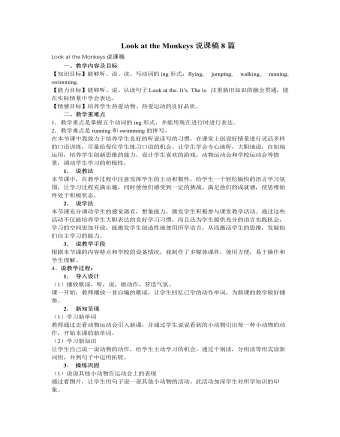
人教版新课标PEP小学英语五年级下册Look at the Monkeys说课稿8篇
四、拓展提高,评价促学1、欣赏故事。在学习完所有内容后,老师请学生继续听、看和试着说出这个童话故事的一部分,然后通过拜访几个动物的家庭,利用我们眼睛看到的事物,我举例示范了一个对话,并根据听到的内容将所缺少的单词填写进去。在原来听、说、读的基础上,增加了写的环节,真正完成了单词的四会要求。2、童话表演。这个童话故事将所有的内容综合在一起,是单词与句型的综合运用。在学生听说读写的训练过程之后,两人小组的表演培养了学生的合作学习能力,让学生们通过师生、生生、小组等不同的合作方式,学会倾听,学会评价。3、中心升华。最后,我利用小鸟的眼睛,我们一起欣赏了大千世界各种美丽的事物,让学生学习之余,能够有所减压和感受,连青蛙都喜欢上整个世界,跳出了小井,感受整个世界的美好。五、课堂小结,作业布置(1) 抄写所学的四会单词。(2)将童话剧表演给父母看。这一环节培养了学生语言的运用能力,体验学习英语的成功带来的喜悦,达到学以致用的目的。

人教版新课标PEP小学英语五年级下册This Is My Day说课稿4篇
六, 说教学难点1. 培养学生合作学习的能力.,同时注意培养学生学习英语的兴趣, 树立自信心.2,单词mountain引导学生分音节模仿读音,掌握拼写,强调字母组合ou 发( ),ai发( ).将单词grandparents分为grant和parents让学生掌握3,在小组讨论的前提下,在学生挖掘已有的知识点和新的词组七, 说教学准备Let's learn ,let's sing 和Let's chant的录音磁带.以及卡片go to bed get up have dinner eat breakfast play sports do morning exercises .以及短语卡片 climb mountains go shopping play the piano visit grandparents go hiking 以及卡纸八,说教法,学法为了突破这堂课的重,难点,根据小学五年级学生好奇,好胜,内敛,爱面子,表现欲旺盛等生理和心理特点,我主要采取了以任务型教学模式为主,以活动,合作为主线,让学生在教师的指导下,通过感知,体验,实践,参与和合作,游戏感悟等多法并用的方式组织教学.彻底改变传统的"讲授"的教学模式,促进语言实际运用能力的提高.
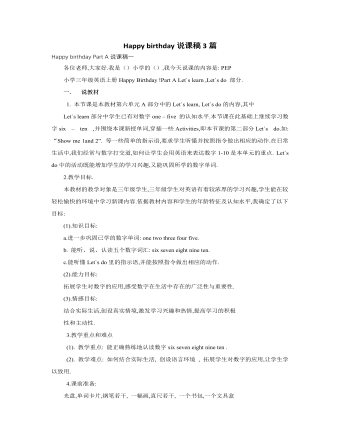
人教版新课标PEP小学英语三年级上册Happy birthday说课稿3篇
四、本课教学目标: ㈠ 语言知识目标: 1.Words: 能正确说birthday。 2.Drills: 能用以下句型进行交流Happy birthday to you. -Thank you.复习句型:How old are you ? (练习有关年龄的问答)。 ㈡ 语言技能目标:根据图片和情境说单词和句子。在一定场景下进行简单的英语交流和表演。㈢ 情感态度目标:通过本课学习使学生有兴趣听、说英语、做游戏、敢于开口,乐于模仿,在鼓励性评价中树立信心,在小组合作学习中感受学英语的乐趣,在给好朋友、亲人过生日的过程中感受友情、亲情的温暖。 五、重点: 1.Learn the words. birthday 2.Using the sentences to ask and answer. 难点: 1. Words: birthday的 正确发音。 2.Using the sentences to ask and answer. 六、课前准备 1 教师准备数字1—10的单词图片课件。。 2教师准备过生日用的蜡烛、气球、生日蛋糕图片等。 3学生准备过生日用的蜡烛、气球、生日蛋糕盒、生日帽等 4学生准备骰子。
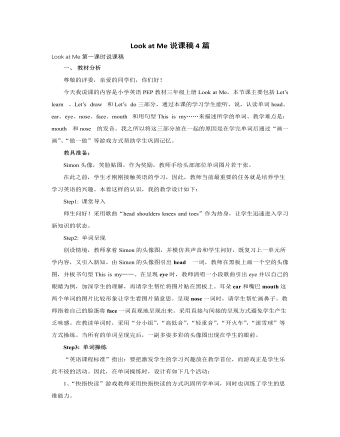
人教版新课标PEP小学英语三年级上册Look at Me说课稿4篇
5. 文化目标:本单元的文化知识是西方的万圣节(10月31日),万圣节是西方孩子们最喜欢的节日之一。他们身穿不同的戏装,戴上千奇百怪的面具,在街区走来走去。不少孩子手中还提着一盏“杰克灯”(Jack-o’-lantern)/南瓜灯,这种灯的做法是先把南瓜挖空,在南瓜上挖出眼睛、嘴和鼻子,贴上蓝色纸,制成南瓜灯,当中点上一支小蜡烛,放出幽灵似的蓝白光。孩子们常常从一家走到另一家,在人家门前高喊:“你想挨捉弄,还是款待我们?”(Trick or treat!)如果主人不给糖果或零钱,这些孩子就会捉弄他(她)。他们有时在门把手上涂上肥皂,有时把人家的猫涂上颜色。这些恶作剧常令大人啼笑皆非。当然,大多数人家都非常乐意款待这些天真的小客人。在晚上,人们常举行晚会,孩子和大人都身穿不同服装。万圣节人们常常做一些传统的游戏和活动,像:试图摘悬挂的苹果,算命,听有关鬼的故事。学校也经常举行晚会或化装游行。
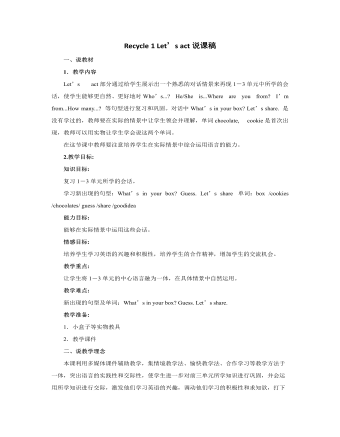
人教版新课标PEP小学英语三年级上册Recycle 1 Let’s act说课稿
小学生学习的主动性,大多取决于兴趣,他们充满好奇,对显而易见的实物和直观信息敏感性强、接受快。借助多媒体计算机CAI辅助教学,把所学内容更加直观地表现出来。4.游戏式复习热身,体现课堂教学开放性利用做游戏的形式进行旧知识的复习,既消除了上课初老师和学生之间的陌生感,又激发了学生学习兴趣,同时又对前面所学内容进行了巩固。5.综合运用“愉快教学”、“情境教学”、“合作学习”等多种教学方法,降低学习难度,活跃课堂气氛。6.展开活动式教学,设计各种形式为教学服务的活动,让学生在学中乐,在乐中学,不断强化知识的巩固记忆。7.设置评比台,及时评价小组及个人表现,鼓励学生积极参与学习活动。四、说教学流程1.拍手游戏热身2.师生问好,交流,对第一页内容复习3.引入第二页内容,学习新单词、句型4.趣味操练

人教版新课标PEP小学英语三年级下册My family说课稿6篇
(1)单词:father (dad), mother (mom), grandfather (grandpa), grandmother (grandma), man, woman(2)学唱英语童谣《Father and Mother》。难点:表示家庭成员单词的认读三、说学情三年级第二学期的学生,能够认读少量简单的单词;但是由于英语不是我们的母语,在日常生活中少于应用,学生学得快,忘得也快,在口语交流能力方面很差。因此,在教学中要结合学生的实际情况,采取有效的教学方法进行教学。四、说教法根据教学内容的特点,我在教学中①注重主题化整体设计,以family为主线贯穿始终,结合远程教育资源的利用,给学生创设一个轻松、愉快的学习氛围。②注重在课堂教学中充分体现“以学生为主体”的教学原则,营造“真实性”的语言环境和开放的空间,让学生在交际中学习运用。③在教学过程中设计各种教学活动,让他们在唱中学,在做中学,在玩中学,从而充分调动其学习兴趣,同时还注重培养学生各项能力训练。五、说学法

人教版新课标PEP小学英语三年级下册Where is my ruler说课稿7篇
1、教学内容PEP Primary English BookⅡ Where’s my ruler?第一课时 A. Let’s talk. Let’s practise. C. Culture.2、教材简析本单元的核心教学内容是找东西和借东西的话题与交通工具,学生生活用品的词汇教学及六个字母(Uu Vv Ww Xx Yy Zz)的听、说、读、写。①Let’s talk. 会话学习。本课时通过寻找东西这一情境,学习句型Where is …?及掌握介词in 、on 和under的用法,让学生在模仿、学习表演的基础上达到自然交流和真实运用。②Let’s practise. 会话游戏活动,让学生在游戏中熟练运用所学问句。③Culture. 文化交流,渗透C部分中“六一”国际儿童节的文化内容,并学唱《Happy Children’s Day》。根据小学英语会话循序渐进的特点,此课作为第一课时,为整个单元教学打好基础,作好教学铺垫。同时,在整一个小学英语教学中,作为交际功能的一部分,它也是一个不可或缺的部分。
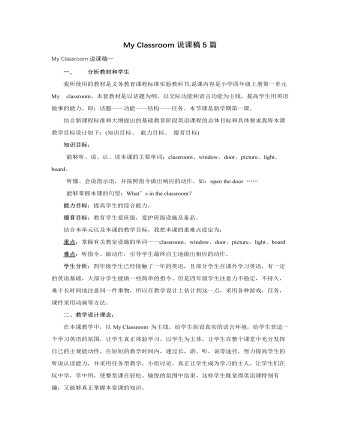
人教版新课标PEP小学英语四年级上册My Classroom说课稿5篇
一 说教材内容本课时的内容是四年级上册第一单元的第4课时,即Let’s learn, Let’ play, Let’s find out和Story time。本课为单词教学,用已学的有关教室设施的单词来引出5个新单词,并用TPR教学法来巩固和操练单词。通过理解故事,来了解学生对本单元知识的落实情况。二、 说教学目的在认真剖析教材的基础上,我针对学生实际,将本课时的教学目的确定如下:1、知识目的:能够听、说、认读本课时的重要单词,能够在教师的领导下完成游戏。能够完成Let’s find out中找字母的任务。能听懂本单元的故事。2、能力目的:能够用英语简略描写自己的教室,能够说出教师中设施的颜色等。3、情绪目的:重视合作精力,激发学生学习英语的兴趣,使学生建立学习英语的信念。三、说教学重点和难点1、重点:本课时需要重点控制另外四个有关教室设备的单词:computer, teacher’s desk, fan, wall, floor。
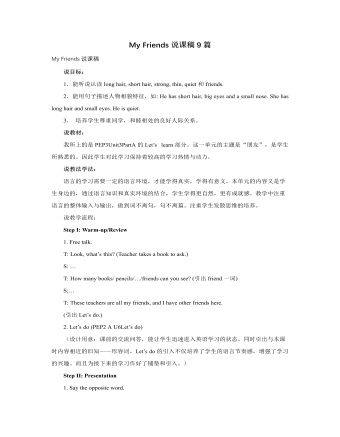
人教版新课标PEP小学英语四年级上册My Friends说课稿9篇
五、说教法课堂教学是实施素质教育的主渠道,优化教育教学过程是改革课堂教学的有效途径。根据小学生的心里生理特点,认识规律以及发展要求,根据教材的编写思想及新课程标准的理念,教师要发挥积极的指导作用,以学生为主体,以人为本,采用直观情景教学、交际法、任务型教学原则、全身动作反应法等激趣。减负增效,展开教学,坚持以话题为核心,以功能,以结构为主线,以任务型活动安排本课教学。六、说学法指导在本课中,我努力以课标为指导,以活动为方式,变课堂为生活。坚持词不离句,句不离章的教学原则,使学生以生活为课堂,逐步提高自己的综合语言运用能力,形成自主学习的能力。七、说教学过程1.以学生为主体,复习导入当课堂奏响以人为本的主旋律,课堂也由专制走向民主,我反思传统课型,一改由教师唱主角的现象,由唱英文歌曲引入,由学生自主从歌曲中歌词找出形容词的反义词:big—small 、 short—long 进行复习。

